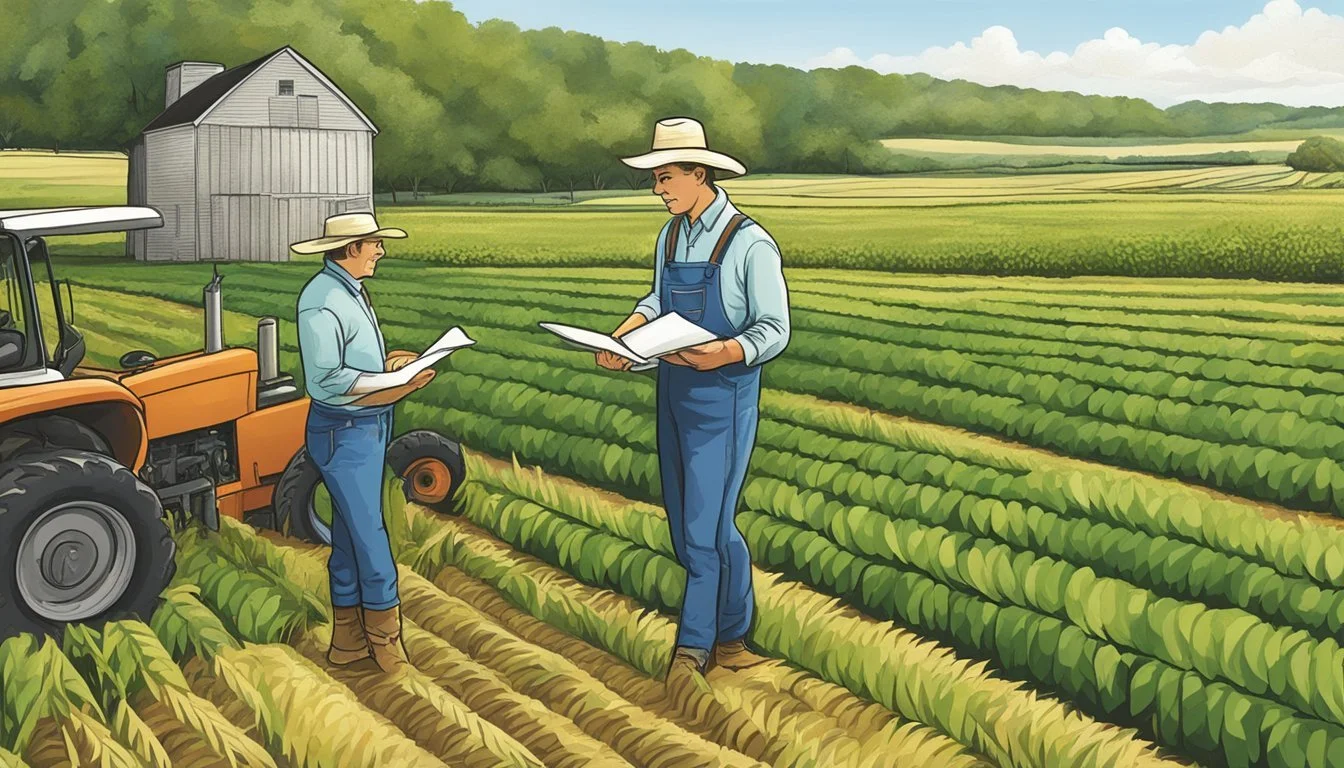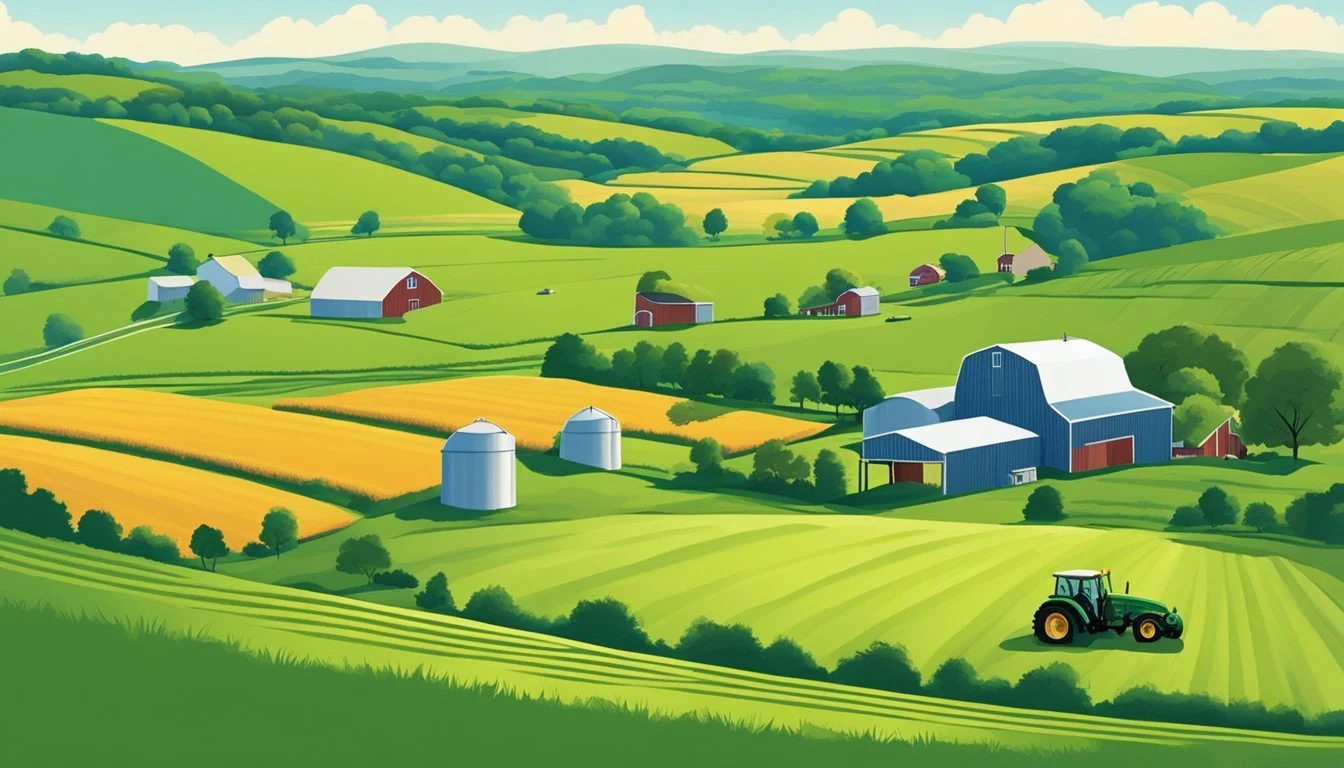Connecticut Farm Land for Lease
Opportunities and Advantages
This Article is Part of Our Guide on Navigating Agricultural Leases Across the US
In Connecticut, the pursuit of leasing farmland is supported by a variety of resources and platforms that cater to the agricultural aspirations of both established and emerging farmers. The state's farmland offers a blend of crop-specific lands and versatile acreage suited to a range of farming activities. Prospective lessees can find properties of varying sizes, from small-scale plots suitable for hydroponics and specialized organic farming to larger tracts that can support extensive crop farming or livestock operations.
Connecticut's Department of Agriculture underscores the importance of secure written leases for farmland, especially since many grant and loan programs require a minimum five-year lease to ensure eligibility. This requirement not only fosters stability for the farming community but also encourages responsible stewardship of the land. With organizations like Connecticut FarmLink providing updated listings of available farmlands, the process of finding and leasing agricultural land in the state is more accessible.
These platforms and services offer a critical link between landowners and farmers, bridging gaps in the leasing market and ensuring that Connecticut’s arable lands are utilized efficiently. By leveraging the state's supportive frameworks and established networks, individuals looking to lease farmland in Connecticut are well placed to embark on or expand their agricultural endeavours.
Overview of Connecticut Farm Land Leasing
Leasing farmland in Connecticut offers numerous benefits and opportunities for both landowners and farmers. Detailed knowledge of the local landscape and soil types is essential for successful leasing agreements.
Key Benefits of Leasing in Connecticut
Leasing farmland in Connecticut provides a pragmatic avenue for farmers seeking access to land without the financial burden of purchasing it. For landowners, leasing out their farmland can ensure that their property remains in agricultural use and generates income. The USDA Farm Service Agency offers loan programs for purchasing farmland, which can be helpful for both parties in establishing a lease agreement.
Benefits for Lessees:
Access to land with less upfront capital required compared to purchasing.
Opportunity to expand operations and increase local food production.
Benefits for Lessor:
Steady income from lease payments.
Maintenance of land in agricultural use, potentially with tax benefits.
Understanding Connecticut’s Farmland Landscape
Connecticut's farmland is diverse, with an array of soil types critical for different kinds of agricultural production. The USDA Natural Resources Conservation Service Web Soil Survey provides an indispensable tool for lessees and lessors alike to understand and assess the quality of the soils present on a potential lease property. This information greatly aids in decision-making, as selecting the appropriate soil type is vital for crop suitability and overall farming success.
Key Landscape Considerations:
Regional soil types.
Accessibility of land for farm operations.
Existing infrastructure affecting land use.
Through tools like the Web Soil Survey, prospective lessees can map out and analyze the properties available for lease, ensuring that the farmland's characteristics align with their agricultural requirements.
Types of Farm Land Lease Arrangements
Leasing farm land in Connecticut comes with various options tailored to the needs of both landowners and farmers. These arrangements range in duration, financial structure, and relationship to labor and future ownership.
Short Term Vs Long Term Leases
Short Term Leases:
Duration: Typically 1 year
Advantage: Allows trial of the leasing arrangement
Disadvantage: Uncertainty beyond the current year
Long Term Leases:
Duration: Often exceeds 5 years
Benefit: Stability for long-term planning
Requirement: Such leases usually need a written agreement for eligibility in government programs involving grants or loans.
Lease with Option to Buy
Structure: Tenant leases farmland with the option to purchase it during or at the end of the lease term.
Flexibility: Offers tenants a way to start farming immediately while planning for future ownership.
Owner-Financed Sales
Arrangement: Landowner acts as the lender for the purchase.
Terms: Buyers typically pay a down payment, followed by installments.
Ownership Transfer: The deed transfer happens once the full price is paid.
Employment-Tenure Arrangements
Description: The farmer works as an employee before transitioning to owner.
Process: Land is transferred after a set employment period, often with favorable terms.
Objective: Aimed at providing a pathway to ownership through tenure.
Finding Farm Land for Lease
When seeking agricultural land for lease in Connecticut, prospective tenants can utilize dedicated resources and tools to facilitate their search and ensure informed decisions.
Connecticut Farmlink and Land for Good Resources
Connecticut Farmlink is a comprehensive platform that connects farmers with available farmland. The program mitigates the obstacle of high land cost by offering lease options. Land for Good, a nonprofit organization, collaborates with Connecticut Farmlink to assist in crafting lease agreements tailored to both the farmer's and landowner's needs, ensuring equitable terms for all parties involved.
Filtering Tools and Profiles
Prospective lessees have access to filtering tools on various online marketplaces that allow them to specify criteria such as location, acreage, and type of farming suitable for the land. Profiles of available properties provide detailed information, which may include soil type, water sources, and existing infrastructure, facilitating a match that aligns with the farmer's experience and business plans.
Consulting with Farming Experts
Consultation with farming experts can be instrumental for those inexperienced in agricultural leases. These experts offer a wealth of farming experience and can advise on legal, financial, and environmental considerations. Engaging with consultants or agricultural extension services ensures that lessees are fully informed about the responsibilities and opportunities of leasing farmland in Connecticut.
Legal Considerations for Leasing
When leasing farmland in Connecticut, it's critical for both landowners and tenants to understand the legal framework that governs such agreements. This involves careful drafting of the lease contract and an awareness of state and local regulations.
Drafting a Lease Agreement
A well-structured lease agreement is paramount to protect the interests of both parties. It should clearly detail:
Description of the Property: This must include the precise boundaries and condition of the land being leased.
Lease Term: The duration of the lease, typically requiring a minimum of five years for grant and loan program eligibility in Connecticut.
Rent Payments: Terms of how and when the rent is to be paid, along with any revenue sharing arrangements, if applicable.
Maintenance and Repairs: Responsibilities for upkeep should be outlined to avoid future disputes.
Subleasing: Policies surrounding the tenant's right to sublease should be addressed.
Termination Provisions: Conditions under which either party may terminate the agreement, including any notice periods required.
Understanding State and County Regulations
Compliance with Connecticut and county laws is non-negotiable. Lessees and lessors must be aware of:
Zoning Laws: These laws dictate the allowable uses of the land in various parts of a county, such as Clark County.
Environmental Regulations: Rules designed to protect the land, water, and biodiversity, which affect what can be done on the property.
Insurance and Liability: Requirements to mitigate financial risk in case of damage or accidents on the leased property.
Agricultural Easements: These may affect land use and should be considered during the leasing process.
Both parties should seek legal counsel to ensure that their lease agreement is compliant with all applicable laws and regulations.
Farm Land Infrastructure and Resources
When considering farm land for lease in Connecticut, potential lessees must evaluate the existing infrastructure and resources critical to the success of agricultural operations.
Buildings and Facilities on Leased Land
The presence of buildings and facilities on leased farm land varies and can significantly affect the type and scale of the farming operation. Structures such as barns, storage sheds, and greenhouses are common assets that enable year-round production and safeguard machinery and livestock. Prospective farmers should inspect these buildings for functionality and condition; ensuring they meet the needs of their specific operation—whether it's crop production or animal husbandry.
Farming Operation Needs
Each type of farm operation—from dairy, poultry, to specialty crop cultivation—has distinct requirements for land and infrastructure. Essential resources like water access, fencing, and proper drainage systems are non-negotiable for operations to flourish.
Livestock operations, for example, require robust fencing, water troughs, and adequate shelter for the animals. On the other hand, crop-based farms may prioritize land with high-quality soil, an irrigation system, and perhaps a climate-controlled facility for sensitive produce. It's important to identify the specific needs of the operation early in the leasing process to ensure the land can support the intended agricultural activities.
Financial Aspects of Leasing Farmland
The financial intricacies of leasing farmland in Connecticut can greatly influence the viability and profitability of agricultural ventures. Land valuation, rent calculations, and investment opportunities play crucial roles in shaping lease arrangements that benefit both landowners and tenants.
Calculating Rent and Lease Terms
Rent for agricultural land is primarily determined by the land's value and the specific terms of the lease agreement. As of recent trends, farmland values have seen a considerable increase, with land averaging around $12,667 per acre. Lease terms are critical and require precise definition, often including the duration, type of farming activity allowed, and mechanisms for rent review. Rent might be fixed or variable, based on factors such as:
Percentage of gross revenue from crops produced
Base rate plus a percentage of production yield
Lease agreements may also stipulate specific farming practices, ensuring sustainability and adherence to certain agricultural standards.
Partnership and Investment Opportunities
Leasing farmland often opens doors to various partnership and investment opportunities. Landowners and farmers might enter into partnerships to share in both the costs of production and the benefits of the harvest. These partnerships can be particularly attractive when leveraged with programs that offer grants or loans, although these often require a written lease of typically five years or more. Investment opportunities through such partnerships may include:
Sharing the cost of farm improvements
Collaborative funding for equipment or infrastructure upgrades
Prospective leasers should be attentive to agreements that align with their investment capacity and risk tolerance, seeking opportunities that foster mutual growth and profitability.
Getting Started with a Lease
Securing a lease is a critical step for aspiring farmers in Connecticut. It involves understanding legal agreements, knowing where to look for available land, and being aware of financial considerations.
First Steps for Aspiring Farmers
When they are considering farming in Connecticut, the first action aspiring farmers should take is to assess their needs. They should consider the size of the land they require, the type of farming they intend to engage in, and their budget. Typically, programs and grants are available to those who secure a lease for 5 years or more, often necessitating a written lease for eligibility. Aspiring farmers should aim for at least 6 acres to ensure ample space for a variety of agricultural activities.
To ensure a solid start:
Assess the Size: Determine the acreage needed.
Research Farming Types: Decide on the type of farming that suits their skills and goals.
Budget Planning: Account for all potential costs associated with leasing.
Contact Information and Next Steps
After defining their leasing needs, aspiring farmers should actively seek out available farmland. They can utilize resources such as the Connecticut Farmlink program, which connects them with landowners looking to lease. This can be a valuable tool for both parties.
For further action:
Find Resources: Use Connecticut Department of Agriculture's Farmlink.
Contact Options:
Email: Preferred initial contact method for records.
Call: For direct communication after initial email.
Secure Lease: Aim for a written lease of 5 or more years.
Farmers should maintain detailed records of their contact and agreement details, as these will be crucial for engaging in grant and loan programs. By following these steps meticulously, they are well on their way to beginning their farm leasing journey.
Success Stories and Case Studies
The rise in demand for locally grown products in Connecticut has led to innovative leasing models and successful farming operations. These success stories involve a synergy of arrangements between landowners and farmers that have forged fruitful partnerships and productive farmland utilization.
Successful Farm Land Lease Models
Various leasing models have proven effective in Connecticut. They serve as templates for replication by other communities looking to establish successful agricultural ventures. One common model involves long-term leases that provide farmers with the security needed to invest in the land and its productivity. Another model is the flexible lease agreement, which caters to both parties' needs, adapting to changes in market conditions or farm operations.
Many lessees are new or young farmers who lack the capital to purchase land outright, relying instead on these leases to start and grow their operations. Educational institutions and townships have also been key players, providing land and support to local farmers through lease arrangements.
Profiles of Successful Connecticut Farmers
River Ridge Farm is a beacon of success in Connecticut's farming community. Initially an orchard in the early 1960s and a nursery in the 1980s, its transformation into a thriving farm is a result of a strategic lease arrangement that allowed for expansion and diversification.
Another profile worth highlighting is the CT FarmLink program, which has been instrumental in matching farmers seeking land with farmland owners looking to sell or lease acreage. The program offers resources and technical assistance on farm leasing, illustrating the symbiotic relationship between aspiring farmers and land availability. Their approach ensures that agricultural land remains productive and supports the continuation of farming traditions in Connecticut.
These profiles and models showcase the variety and adaptability of leased farming operations in Connecticut, emphasizing that with the right arrangements, both landowners and farmers can benefit significantly from such collaborations.










